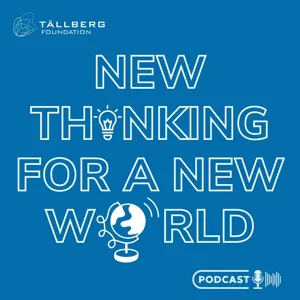Podcast Summary
Competition for Congo's Cobalt Resource: The control of Congo's cobalt resource, a key component in electric vehicle batteries, could significantly impact the global economy and geopolitical landscape as the world transitions to clean energy.
The Democratic Republic of Congo, which holds approximately two-thirds of the world's cobalt supply, is a focal point in the global competition between China and the United States. Cobalt, a key component in batteries for electric vehicles, is essential for the ongoing industrial revolution towards clean energy. The high-grade, easily accessible cobalt in Congo makes it a valuable resource, and as the world transitions to electric vehicles, control over this resource could significantly impact the global economy and geopolitical landscape. The bustling hotel lobby in Kinshasa, the capital of Congo, serves as a testament to this, with many individuals present for the sole purpose of securing cobalt.
The Cobalt Rush in Congo: Industrial and Freelance Mining: In Congo, large-scale industrial mines and small-scale freelance operations coexist, with miners like Jorge Punga digging for cobalt since childhood, creating a complex system of cobalt production.
The mining region in Congo is a hotbed for cobalt production, with both industrial and freelance miners extracting the valuable mineral from the ground. I was initially reporting on the situation, but soon realized the extent of the cobalt rush. I visited a mining hub city called Kuwaiti and traveled up and down the highway, observing large-scale industrial mines as well as small-scale operations where people used shovels and pickaxes to dig for cobalt in the dirt. I met Jorge Punga, a digger who had been extracting minerals and metals, including cobalt, since he was 11 years old. He and other miners would dig deep tunnels, emerge with giant bags of cobalt, and sell it at a row of tin shacks for pulverizing and determining its purity and grade. The sound of sledgehammers smacking against the concrete floor was constant. Jorge had been digging every day since he was a child, chasing after the mineral or metal in demand, and now he had turned to cobalt. During my visit, I also passed by a massive black mountain, which turned out to be a pile of cobalt ore waiting to be processed. The cobalt rush in Congo is real, and it's a complex system involving both industrial and freelance miners.
Competing for Congo's Valuable Resources: A Race Between the US and China: The US and China are in a race to control Congo's cobalt resources, with a history of American interest dating back to WW2 and the Cold War, but the local miners and Congo as a whole have not benefited from this resource rush.
The race for control of Congo's valuable resources, specifically cobalt, has turned a mountain of waste into a potential goldmine. This resource rush, however, has not benefited the local miners or Congo as a whole, but rather two global superpowers, the United States and China, who are vying for dominance. The history of American interest in Congo dates back to World War 2, when the country's natural resources, including uranium, were crucial to the US. During the Cold War, the US and China both sought to secure Congo's resources to keep the other power at bay. In the 1970s, the US attempted to woo Congo's president with gifts and support, but as the focus shifted towards oil in the 1980s, Congo was largely forgotten. Today, the race for cobalt has renewed interest in Congo, and the US and China are once again competing for control of this valuable resource.
US focus shifts from Congo to Iraq, China steps in: China's investment in Congo's infrastructure in exchange for access to minerals gave it significant influence in the Congolese mining industry, particularly in cobalt production, which is crucial for electric vehicles.
The strategic interests of nations shift over time, leading to changes in investment and involvement in various regions. During the early 2000s, the US focused on its interests in Iraq, leading to a decrease in investment in the Democratic Republic of Congo. Simultaneously, China identified the need for resources, particularly minerals and metals, to fuel its industrial growth and turned to Congo. In 2005, China and Congo struck a deal, with China investing in infrastructure in exchange for access to copper and cobalt. This deal marked the beginning of China's significant influence in the Congolese mining industry. As the world's focus on electric vehicles increased the demand for cobalt, China's control over a significant portion of the world's cobalt mines has given it a strong position in the market. In the past, the US held a dominant position in Congo due to its strategic interests, but now, the roles have reversed, with China investing in Congo to advance its own interests.
China's Control of Congo's Cobalt Market: China dominates Congo's cobalt market with 15 out of 19 mines, but potential issues and reevaluations could allow US to re-enter
China has gained control of the majority of the cobalt market in the Democratic Republic of Congo, owning 15 out of 19 industrial cobalt mines. This dominance came about due to China's ability to make the best offers when key assets were sold off, leaving the US and other competitors behind. However, recent developments, including the Biden administration's focus on electric vehicles and potential issues with Chinese mining companies in Congo, could create an opportunity for the US to re-enter the market. The situation is fluid, and the Congolese government is currently reevaluating contracts and allegations of unfulfilled promises, which could lead to changes in the relationship with Chinese mining companies and potentially an opening for the US.
DRC's Cobalt: A Global Power Play: The DRC's instability and reliance on international partners for cobalt mining and export leaves it vulnerable to political leverage. China's control of the global cobalt market poses a risk for US access. The Biden administration aims to secure US access to cobalt and other essential materials for clean energy production.
The Democratic Republic of Congo (DRC) holds a significant amount of the world's cobalt supply, which is essential for the production of electric batteries. However, the DRC's instability and reliance on international partners for mining and exporting the resource leaves it vulnerable to political leverage from countries like China, which has been aggressively securing control of the global cobalt market. The US, which has historically relied on Congolese cobalt, risks being left behind if it doesn't regain access to the market. The stakes are high, as whoever controls the cobalt supply chain will have significant political and economic power in the new global economy that relies heavily on renewable energy. Recently, a court ruling in Congo forced China Mali to give up control of one of its cobalt mines, providing an opportunity for the US to re-enter the market. The Biden administration has announced investments aimed at securing US access to cobalt and other essential materials for clean energy production. This is not an anti-China or anti-anything else stance, but rather a pro-American one that ensures the US can meet the challenges of the 21st century.
Russian Forces Make Minimal Progress in Ukraine Invasion, Over 7000 Soldiers Killed: British intelligence assesses minimal Russian progress in Ukraine invasion, over 7000 Russian soldiers killed in three weeks, potential use of chemical weapons and false blame by Russia
Despite heavy losses, Russian forces have made minimal progress in their invasion of Ukraine, according to a British intelligence assessment. The US estimates that over 7000 Russian soldiers have been killed in just three weeks of fighting, surpassing the number of American troops killed in Iraq and Afghanistan combined. Russia may respond by using a chemical weapon and falsely blaming Ukraine to escalate attacks on the Ukrainian people, as Putin's frustration grows. The US Secretary of State, Anthony Blinken, has warned of potential extreme measures, including the deployment of chemical weapons. This episode was produced by Michael Simon Johnson, edited by Patricia Willans, Mark George, Paige Cowett, and Anita Bottigio, and engineered by Chris Wood. Our theme music is by Jim Brunsberg and Ben Landsberg of Wonderly.





